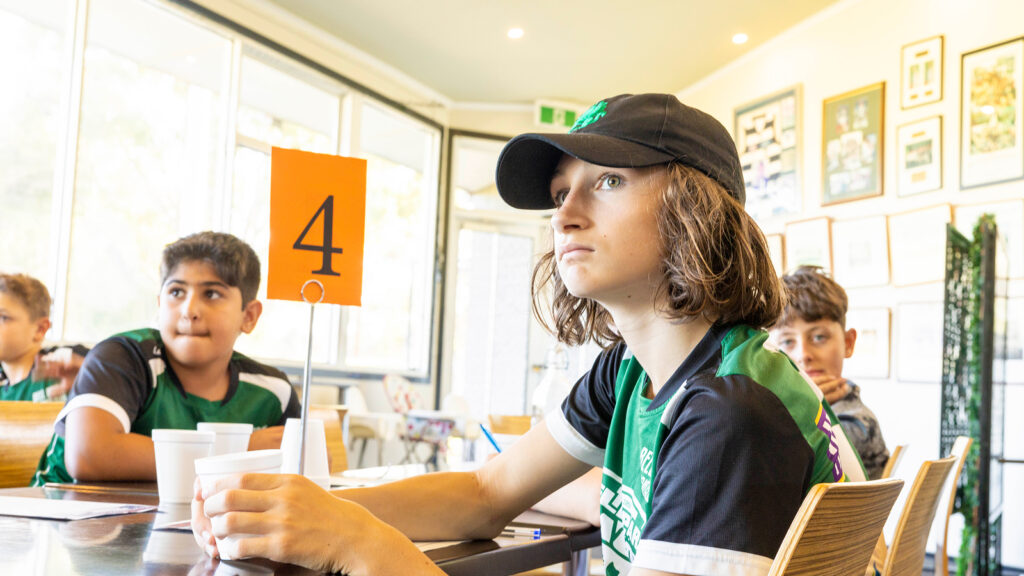For Clubs
Creating Mentally Healthy Sporting Clubs
Sporting clubs play a vital role in shaping young players’ lives—on and off the field. At Read the Play, we help clubs create a positive, supportive environment where mental health is valued just as much as physical performance.
By normalising conversations about mental health, appointing Player Wellbeing Officers (PWOs), and providing practical resources, we empower clubs to support young players, coaches, and families. Together, we can build stronger, more connected, and mentally resilient sporting communities.

Your club can make a difference.
Let’s work together to support mental health in sport.

Why Mental Health Matters for Clubs:
A thriving club isn’t just about winning games—it’s about supporting the wellbeing of every player, coach, and volunteer. Mental health affects performance, teamwork, and overall club culture, making it essential to create an environment where young players feel safe, supported, and heard.
The Reality in Sport
The Reality in Sport
- 1 in 4 young Australians will experience a mental health challenge.
- Many players struggle in silence, fearing stigma or judgment.
- Clubs that promote mental health see stronger team connections and better player retention.
The Role of Sporting Clubs
- Foster a supportive culture where players feel comfortable speaking up.
- Educate coaches, parents, and volunteers on recognising mental health challenges.
- Equip Player Wellbeing Officers (PWOs) to provide guidance and connect players with support.
By prioritising mental health, clubs can create stronger teams, healthier players, and a positive sporting environment that benefits everyone.
Recognising Signs in Team Members:
As a club leader, coach, or volunteer, you play a crucial role in supporting the mental wellbeing of young players. Recognising the signs of mental ill-health early can make a real difference in helping them get the support they need.
Signs to Look Out For
Avoiding Activities – Missing training or games without explanation.
Changes in Behaviour – Withdrawal from teammates, loss of interest in training or games, or sudden mood swings.
Emotional Distress – Persistent sadness, irritability, or increased frustration.
Physical Signs – Constant fatigue, trouble sleeping, or changes in appetite.
Unusual Comments – Expressing feelings of hopelessness, self-doubt, or struggling to cope.
What Can Clubs Do?
- Create a Safe Space – Let players know your club supports mental health conversations.
- Encourage Open Conversations – Check in with players regularly and remind them that support is available.
- Utilise Your Player Wellbeing Officer (PWO) – Ensure they are visible, approachable, and equipped to guide players to further help if needed.
Recognising these signs early and taking action can help young players feel supported and ensure they get the help they need.
Starting the Conversation: How to Check In with a Young Player
Talking about mental health can feel daunting, but a simple conversation can make all the difference. Here are some ways to start:
Who Can You Talk To?
- Find a quiet, private moment—before or after training, on the sidelines, or during a casual chat.
- Keep it relaxed and natural—avoid putting pressure on them to open up straight away.
Ask Open-Ended Questions
- “You haven’t seemed yourself lately. Is everything okay?”
- “I’ve noticed you’ve been a bit quieter than usual at training. Want to chat?”
- “How’s everything going for you outside of sport?”
Listen Without Judgement
- Give them space to talk and resist the urge to ‘fix’ the problem straight away.
- Show empathy by using phrases like “That sounds really tough” or “I’m here for you if you need to talk.”
Encourage Support
- If they open up, thank them for sharing and let them know they’re not alone.
- Suggest speaking to a Player Wellbeing Officer (PWO), coach, teacher, or a mental health professional.


How Read the Play Supports Clubs
At Read the Play, we equip clubs with the tools, training, and resources to create a mentally healthy sporting environment. By fostering open conversations about mental wellbeing, we help clubs support their young players, coaches, and volunteers.
Build a Strong Support Team
Player Wellbeing Officer (PWO) Training
We provide training for dedicated club volunteers to become PWOs—trusted support figures who help young players navigate mental health challenges and seek further support when needed.
Interactive Mental Health Programs
Our engaging, sport-based programs—such as Huddle Up, MVP, Play On, and Take a Chance—help educate young players on mental health literacy, help-seeking, and resilience.
Resources & Workshops
We offer workshops, guides, and online resources for clubs, coaches, and parents to recognise signs of mental ill-health and start meaningful conversations with young players.
Building a Supportive Club Culture
We help clubs normalise mental health discussions by integrating wellbeing initiatives into their culture, making sure players feel safe, heard, and supported.
Frequently Asked Questions
About Read the Play
How much does it cost to run a program at my club?
Our programs are funded through donations, partnerships and grants, making them free for clubs. Get in touch with us to find out how your club can participate.
How do I bring Read the Play to my club?
It’s easy! Book Now.
Is there training specifically for coaches?
Yes! We offer mental health awareness events throughout the year for coaches to help them recognise signs of mental ill-health, support young players, and create a positive club culture.
Who delivers the Read the Play sessions?
Our sessions are facilitated by trained presenters who specialise in youth mental health education. We also work closely with clubs to ensure Player Wellbeing Officers (PWOs) are equipped to support young players.
What sports does Read the Play work with?
We currently work with football, netball, basketball, hockey, soccer, and more. If your sport isn’t listed, reach out—we’re always looking to expand!
How long does a Read the Play session go for?
Each session runs for approximately one hour and is delivered in an interactive, fun and engaging format to keep young players involved.
Does Read the Play provide ongoing support for clubs?
Yes! We offer ongoing training, resources, and club check-ins to ensure mental health remains a priority beyond the initial session.
